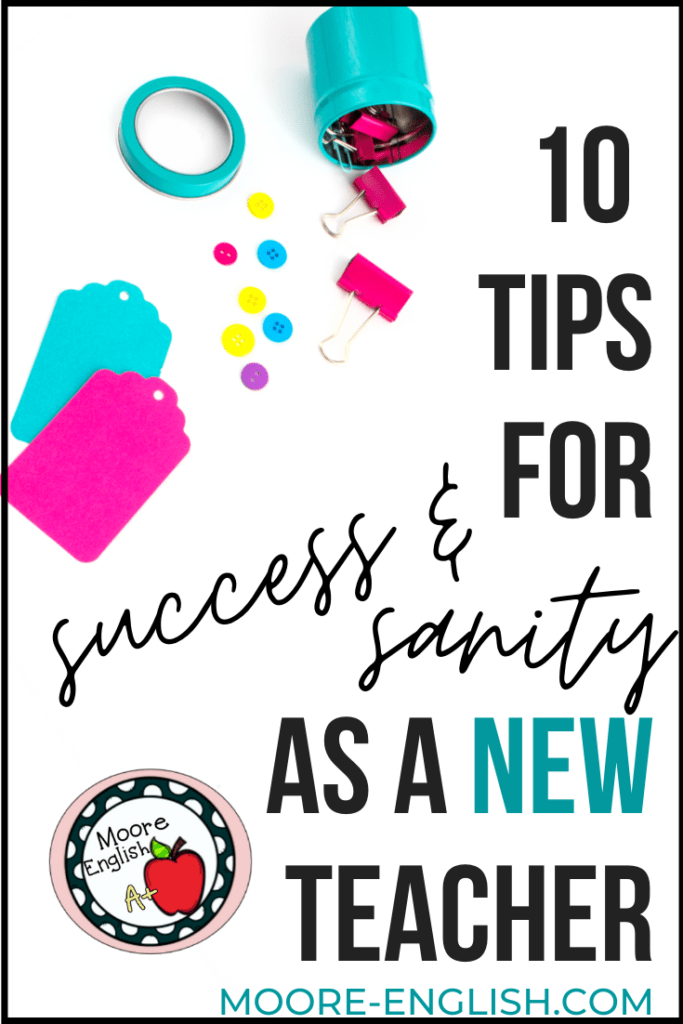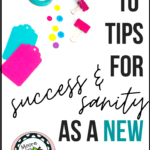My first-year of teaching I shared a classroom, kept getting lost in the building, and ate a ton of McDonald’s. There were lots of people willing to help me out. But I had no idea how to ask. While the students I met that year changed my life forever, I still made life harder on myself than necessary. Did the experience make me a better teacher? Yes. But could the experience also have been easier? Yes. For that reason, I put together a list of suggestions for new teachers.

This post this post may contain affiliate links. Please read the Terms of Use.
Getting Started as a New Teacher
1. Find a mentor. Having a mentor teacher is invaluable: they can help you navigate the building’s quirks and familiarize you with department and building procedures. My mentor was able to answer all of my silly questions, including ones I didn’t know I had. She also provided resources and guidance that proved invaluable. A lot of schools assign mentors, but if yours doesn’t, seek one out. In other words, find your bell weathers and let them guide you.
2. Ask questions. As department chair, I see a lot of new teachers make fumbles that they could have avoided by just asking a question. Don’t know what rubric to use? Ask. Don’t know where to get extra copy paper? Ask. Don’t know how to schedule library time? Ask. In the long run, this will help you get familiar with your building, your co-workers, and will show everyone how willing you are to learn.
Organization as a New Teacher
3. Develop a manageable organizational system. Social media provides all kinds of adorable and perfectly-labeled organizational systems. I LOVE looking at planners on Instagram. But I know that planner-style organization doesn’t work for me. So find an organizational system that works for you and that you can manage. Elaborate systems take time to perfect, and your first year, you just need something that works.
4. Design backwards. Figure out your team, department, or building’s curricular expectations and work backwards from the summative assessments to design daily lessons. Don’t plan from beginning to end, plan from ending to beginning. If you know where you want students to end up, you can plan anything.
5. But don’t reinvent the wheel. Lean on your team, department, and building for curricular resources. Figure out what they have and make it work for you and your students. There’s 150+ years of teaching experience in my department alone! Consider the collective teaching experience of your co-workers, and learn from them.
New Teacher Survival
6. Invest in yourself. Your first year (every year) will probably have some long days. So make sure to invest in yourself. That might mean taking time for weekly meal prep or going back to school or taking yoga classes or buying bubble bath. Whatever that means for you–it’s okay. There’s no honor in being a teacher martyr. So there’s no need to feel guilty about taking time for yourself. Teacher burnout is real, but it’s also avoidable. Teacher life has to be sustainable.
7. Copy weeklies ahead of time. This may seem like strange advice. But if you have a set of copies you need each week (bell work, DOL, timed tests, spelling lists, etc.), make the copies ahead of time. I copy all of my grammar weeklies at the beginning of the year. It takes several hours after school or on the weekends to get this done. But it is 100% worth it. There’s nothing worse than needing your bell work Monday morning when the copy machine is broken.
8. Make some practical (rather than aesthetic) choices. Instagram can lead us to some wild conclusions about what our classrooms should look like (and how much they should cost). So know that it is okay to make practical choices. For example, as a new teacher, I could never have managed flexible seating, so I didn’t do it. Does my emergency clipboard look aesthetically pleasing hanging on the door? No, but it’s super practical. Are my turn-in bins beautiful? No, but I don’t want to be without them. Is the crate where I keep my pre-copied work the most attractive thing ever? No, but I don’t ever have to run to the copy machine at the last minute. It’s okay to make some choices that allow your classroom (and you) to function smoothly. If that looks cute, great. If not, that’s okay, too!
New Teacher Sanity
9. Learn when to say “yes” and how to say “no.” Find a way to get involved in your school. Join a committee, sponsor a club, do some tutoring, meet every secretary and custodian. But don’t feel like you need to do everything. Say “yes” to opportunities you will enjoy and that will fill your bucket, and say “no” when the alternative is exhaustion.
10. Have fun! You’ll never again be a new teacher. The students you meet your first-year teaching will stay with you forever. They will teach you lessons unfound in textbooks, and their handprints will be on your heart for the rest of your career. Smile with them. Learn with them. Remember why you decided to become a teacher.

Picture from Ivory Mix















